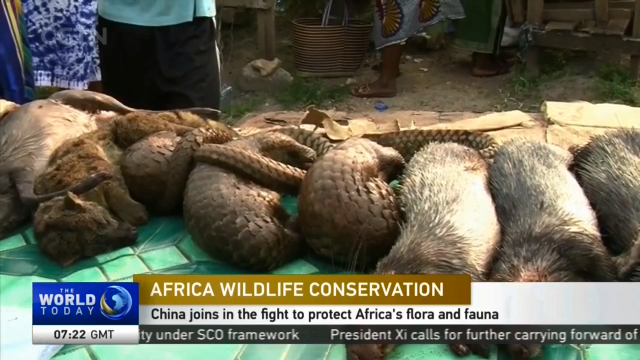
15:55, 10-Jun-2018
Africa Wildlife Conservation: China joins in the fight to protect Africa's flora and fauna
02:22

China is working with Africa to protect the continent's wildlife. Tens of thousands of animals are poached every year, including rare elephants, rhinos, pangolins. Trade of their ivory, horns and shells is all banned internationally. Conservation experts are meeting in Johannesburg to find a way to keep these animals from being wiped out.
Pangolins are the most highly poached creatures in the world. Between 2006 and 2015, more than a million were slaughtered.
PROFESSOR RAY JANSEN CHAIRMAN, THE AFRICAN PANGOLIN WORKING GROUP "We don't know how to count pangolins. They're so secretive and elusive and quiet, nocturnal creatures that we just don't see them. We actually don't know how many there are but one thing we do know for certain if this carries on they'll be extinct in the next two or three decades."
Like rhino horn, pangolin shells are rich in keratin. Most of which end up in Vietnam and China for traditional medicine.
ZHOU JINFENG, CHIEF SECRETARY CBCGDF "We are working really, very hard to educate, to train from children and we believe and we also trying to get more scientific evidence to prove those so-called tradition are not real and the alternative western medicine is very good."
Asia's black market demand for wildlife products was on the table at an Africa- China Wildlife conference in Johannesburg this week.
FRANCES CRAIGIE DEPT. OF ENVIRONMENTAL AFFAIRS, SOUTH AFRICA "It's critical that we're working together in order to combat that kind of illegal trade. I'm amazed by the collaboration and the commitment the Chinese Government is showing on this."
JULIE SCHEIER JOHANNESBURG, SOUTH AFRICA "Africa's rhino, elephant and Pangolin populations are dwindling as a result of poaching. The main focus of this conference is to foster deeper dialogue and co-operation between Chinese communities in Africa and conservation organizations to protect these and other endangered wildlife species from extinction."
IRIS HO, PROJECT MANAGER HUMANE SOCIETY INTERNATIONAL "We have already seen a reduction of elephant poaching in some of the African countries and that's a result of collective efforts by consumer countries including China that has an ivory ban."
China has pledged its commitment to fighting illegal wildlife trade. It has put into place strict protection and anti-poaching laws for its citizens at home and abroad. Whether this serves as a deterrent, only time will tell. JULIE SCHEIER, CGTN, JOHANNESBURG, SOUTH AFRICA.

SITEMAP
Copyright © 2018 CGTN. Beijing ICP prepared NO.16065310-3
Copyright © 2018 CGTN. Beijing ICP prepared NO.16065310-3